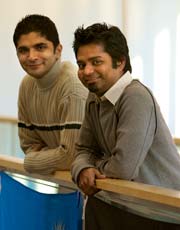Reunited childhood friends share passion for helping kids
In July, incoming MPH student Mohan Sundararaj was settling into an orientation session at the Harvard School of Public Health when a familiar face popped out of the crowd.
“It hit me like a flash,” he says. “Do I know this person? Then I thought, ‘My goodness, thats’ Sanjeev from 7th grade.'” Sanjeev Sriram was a boyhood friend of eighteen years ago—the new kid at St. Michael’s Academy in Chennai, in Tamil Nadu, India, to whom he’d once been close. Sudararaj reintroduced himself, and the air discovered that though their paths had diverged, they shared a passion for public health.
ADVOCATING FOR AT-RISK KIDS
Sriram, now 29, has spent most of his life in the United States, but the two years he spent with his parents in India had a lasting impact. The contrast between the urban streets of Chennai and his childhood home in rural Greenville, South Carolina, was dramatic.
“I think around age 12 you’re at a point in your development where you’re going to be either a very ‘me-centered’ person or a more ‘we-centered’ person,” Sriram says. “Living in India exposed me to the idea of collective responsibility. How can I live for myself when there are this many people in need?”
As a medical resident in the University of California at Los Angeles Pediatrics Program, Sriram developed a plan to educate residents about the experiences of foster children and other high-risk youth in the court system. “A lot of foster kids with medical issues fall through the cracks,” he says. “Social workers, judges, and attorneys may miss the health care issues involved in making good family placements. A kid may have special nutritional needs or appointments that need to be kept. And pediatricians need to learn to communicate with lawyers, judges, and social workers.”
HEALING BODIES AND MINDS
Meanwhile, Sundararaj, also 29, was exploring a different medical direction. An accomplished pianist born into a family of doctors, he followed their path into Sri Ramachandra Medical College, a Harvard Medical International Affiliated Institution in southern India. There, he earned his medical degree but dreamt of becoming a concert pianist. The chance discovery of the field of music therapy, which has been shown to help patients cope and recover, offered a way to combine his two callings, so he moved to Boston to study at the Berklee College of Music.
Before graduating in 2004, Sundararaj interned at a hospice in Palm Beach County in Florida. He worked with terminally ill patients, helping them come to terms with death. In music therapy sessions, he performed songs they loved and helped them write lyrics, which he then turned into songs. “There’s an intimacy with a music therapist that patients couldn’t get by listening to a CD,” Sundararaj says. “It’s not a casual process, it’s part of a treatment plan. And as a therapist, I’m trained to deal with the psychological issues that comes up during a session.”
While he could anecdotally document that patients’ anxiety eased, he found the population difficult to study, given the daily changes that arose in their advanced stages of disease. “It’s a constant struggle that scientists in the integrative medical arena have to go through,” he says. “It is hard to come up with empirical evidence that it helps, but for individual patients it is so obvious.”
Sundararaj moved back to Chennai to pursue a residency in internal medicine, and concurrently set up a private music therapy practice. Later, he moved to Calcutta to work as a physician and became involved with Project Haven, a home for orphaned girls between the ages of 5 and 13 who have suffered abuse and neglect. Sundararaj volunteered with them as both a physician and a music therapist, endeavoring to heal their bodies as well as their damaged psyches.
SCHOLARSHIPS FOR TWO
Now Sundararaj is studying health policy and management at HSPH through a prestigious Catherine B. Reynolds Foundation Fellowship in Social Entrepreneurship. He hopes to establish a nonprofit organization to promote evidence-based music therapy for disadvantaged children in India. This will involve offering training fellowships, earning accreditation, and working to gain governmental recognition of music therapy as an allied health care profession.
Sriram’s focus is in health care and management. His advocacy for children helped garner him a fellowship in minority health policy from the Commonwealth Fund/Harvard University. He plans to continue his clinical work with underprivileged kids. But he also hopes to work on policy issues beyond the confines of the pediatrician’s office, such as universal early childhood education and countering the influence of advertising in the childhood obesity epidemic.
After what Sriram calls a “pretty grinding schedule” of MPH foundation courses during the summer, both he and Sundararaj are looking forward to taking courses in leadership, management, and minority health policy. Then they’ll both get back to the business of changing the world, one child at a time.
Amy Roeder is the Development Communications Coordinator in the Office for Resource Development at HSPH.
Photograph, Kent Dayton/HSPH
